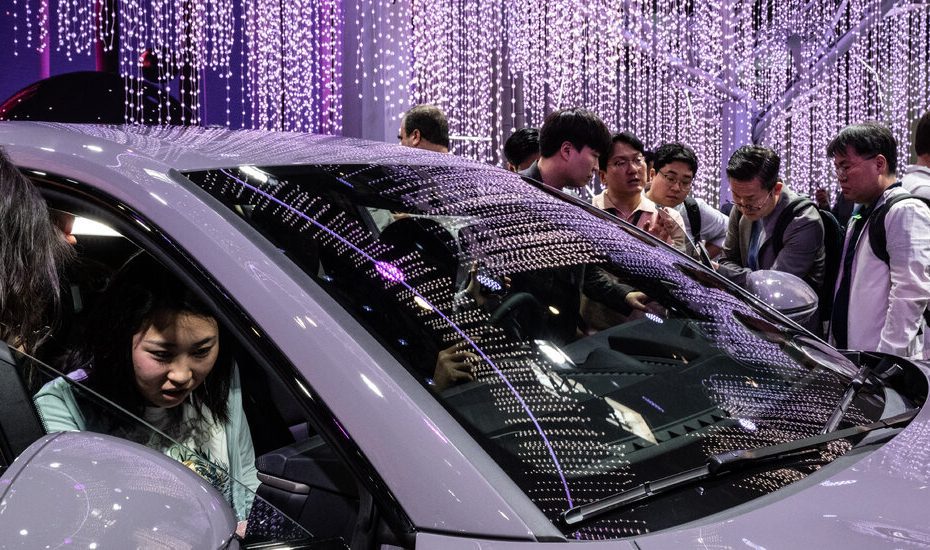After decades of dominating the Chinese market for powerful cars with precision engineering, German car manufacturers lose Chinese rivals that have moved the definition of a high-end car to a car that is electric, smart and affordable.
Many new Chinese vehicles resemble their German rivals, such as the wildly popular Xiaomi SU7, which mimics Taycan from Porsche. With the Taycan in power and brakes with the Taycan, it also contains integrated artificial intelligence that can help with parking and drivers with their favorite song greeted. The icing at the top: it sells approximately half the price of a Taycan.
As a result, the German car manufacturers who have been commanding the Chinese Premium car market now see their turnover, while Xiaomi – a leading Chinese smartphone manufacturer – sold more than 100,000 models of the SU7 last year.
One of the most difficult affected Porsche, who reported last month that his deliveries in China declined 28 percent in 2024. Although Porsche's turnover in every other region had risen around the world, the decline in China was significant enough to its worldwide deliveries To be achieved for his worldwide deliveries for the year by 3 percent.
For years, German car manufacturers relied on the Chinese market to compensate for weaker demand elsewhere, so that they would ignore deeper structural problems at home. The most important among them was a reluctance to accept the technology that has come to define driving in China: electric vehicles equipped with advanced software and, increasingly, artificial intelligence.
“The German, but also the American and Japanese Koreans, have strongly underestimated Western manufacturers of the development dynamics of Chinese manufacturers, namely in the important areas of electrical mobility and software-defined vehicles,” said Stefan Bratzel, director of director From the Center for Automotive Management in Bergisch Gladbach, Germany.
Markt experts said that the progress in software and functions such as automated driving and remote control had become standard in Chinese electric cars, putting pressure on European car manufacturers who were used to cashing in their brand names to perform their play.
“I think Chinese consumers are now ready to accept that Chinese companies can produce cars that are considered premium for them,” said Gary NG, an economist at Natixis Corporate & Investment Banking.
This month, Porsche announced that it would say goodbye to his financial chef and a top sales director, who both had come under pressure for the poor performance of Porsche, also in China.
President Trump has added to the pressure and has instructed his advisers to come up with new tariff levels for the trading partners of America, including the European Union. This could harm Porsche that, unlike BMW, Mercedes-Benz or other Volkswagen brands, its American market only delivers with export from Germany.
Last week Porsche said that it would cut to 1,900 jobs in Germany in the coming years, in the midst of a decrease in global question. The sale of the electric Taycan fell last year by almost half, to 20,836 deliveries and the turnover of the new Panamera, a hybrid model, fell 13 percent last year, partly because Chinese buyers did not show as much interest as expected.
The size of Porsche's problem is reflected in car buyers such as Seaky Hey, a creator of social media who lives in Changsha in the central province of Central Hunan in China. In 2017 she bought her first car, a bright red Mercedes-Benz Cla Coupe. But last year she decided to exchange it for a Xiaomi SU7.
Xiaomi has loaded the SU7 with functions such as automatic parking and remotely activated temperature control, what is exactly what Madam said he wanted from a car and other young Chinese drivers.
“When choosing my new car I didn't even consider buying another German vehicle,” he said.
The SU7 is not yet available for export, but a few models have reached the United States. James D. Farley Jr., the Chief Executive of Ford Motor, said he had sent one from Shanghai to Chicago to drive for six months and “didn't want to give it up.”
Xiaomi has also tested pierced versions have been SU7 Ultra, which will be released in China in March on the German legendary race track, the Nürburgring. In October the car established a record for the 'fastest four -door sedan', and fans in the industry and driving the news, excited that the SU7 Porsche's Taycan had defeated 20 seconds.
Racetrack officials, however, pointed out that the times were not comparable because the Chinese car was a provisional version that competed in an essentially open category, while the Taycan was a showroom ready and ran a highly regulated category. Anyway, the message was unmistakable.
“As German car manufacturers, we have to be at least as much or more innovative as we are more expensive,” said Mr. Bratzel. “And that was gradually lost, because Chinese car manufacturers are just as innovative, and some are even more innovative.”
Keith Bradsher Bettered report from Beijing at. Li you Research contributed from Shanghai.

